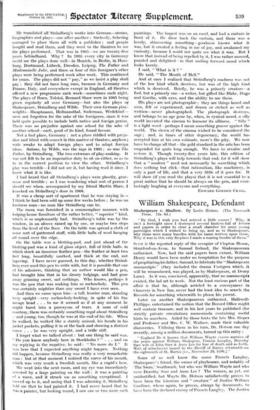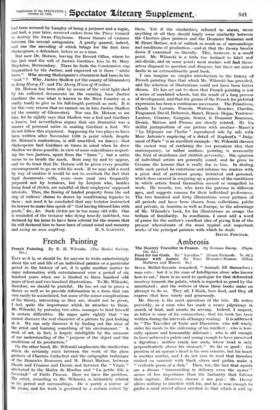William Shakespeare, Defendant
" By God, I wish you had arrived a little sooner ! Why, ii isn't a fortnight since I destroyed several baskets-full of letters and papers in order to clear a small chamber for some young partridges which I wished to bring up, and as to Shakespeare, why there were many bundles with his name written upon them. Why it was in this very fireplace I made a roaring bonfire of them."
Suers is the reported reply of the occupier of Clopton House, Stratford-on-Avon, to Samuel Ireland, the Shakespearean enthusiast. Now, had the said papers been extant, William Henry would have been under no temptation for the purpose of propitiating his father, Samuel, to fabricate the " Shakespeare manuscripts" (they included the drama Vortigern which, it will be remembered, was played, as by Shakespeare, at Drury Lane). As it was, convinced, apparently, that no manuscripts existed, the lad set to work. Not the least curious part of the affair is that he, although articled to a conveyancer in Chancery in New Inn, never had the least idea to search the Records for something wherewith to please his parent.
Later on another Shakespearean enthusiast, Halliwell- Phillipps, entertained the notion that the Record Office might well contain treasure, and in his last years he published (for strictly private circulation) memoranda containing useful hints to searchers. Aided by those hints the late Mrs. Stopes and Professor and Mrs. C. W. Wallace, made their valuable discoveries. Utilising them in his turn, Dr. Hotson one day recently, among a million documents, turned up this entry :
" England Be it known that William Wayte craves sureties of the peace against William Shakspere, Francis Langley, Dorothy Soer wife of John Soer & Anne Lee for fear of death and so forth. Writ of attachment issued to the Sheriff of Surrey returnable on the eighteenth of St. Martin [i.e., November 29, 1596.]."
Some of us well know the name Francis Langley, Shakespeare's friend, the owner of playhouses, and notably of The Swan,' Southwark, but who was William Wayte and who were Dorothy Soer and Anne Lee ? The women, as yet, are unidentified, but Wayte Dr. Hotson satisfactorily proves to have been the kinsman and " creature " of Justice William Gardiner, whom again, he proves, always by documents, to have been the declared enemy of Francis Langley. The Justice had been accused by Langley of being a perjurer and a rogue, and had, a year later, received orders from the Privy Council to destroy the Swan Playhouse. Hence threats of violence between the several antagonists. A pretty quarrel, indeed, and one the unveiling of which brings for the first time Shakespeare, a defendant, before us as a man.
But now Dr. Hotson, leaving the Record Office, where he has just read the will of Justice Gardiner, hies to St. Mary Magdalen, Bermondsey. There he finds the Communion cup bequeathed by the Justice, and engraved on it three " white 'trees." Who among Shakespeare's characters had lutes in his " coat" ? Why, Justice Shallow (of the county of Gloucester) jo' King Henry IV. and The Merry Wives of Windsor.
Dr. Hotson has been able by means of the vivid light shed by his collected documents on the cunning, base Justice Gardiner (he was 'what is known in the West Country as a crafty toad) to give us his full-length portrait as such. It is for this very reason that we cannot see in him Justice Shallow (of the county of Gloucester). Nor can Dr. Hotson so see him, for he rightly says that Shallow was a fool and Gardiner a knave, but nevertheless argues that our dramatist was a master of personal satire in making Gardiner a fool. We do not follow this argument. Supposing the two plays to have been written after November 1596 (a point which, despite Dr. Hotson's contentions, is still unsettled, we fancy)—that Shakespeare had Gardiner at times in mind when he drew Shallow we deem possible, in view of some coincidences respect- ing the two justices, apart from the " fuces " ; but a satire seems to us beside the mark. More may by and by appear, and we do trust that Dr. Hotson will be given every possible encouragement to go on with his work. If we may add a word by way of caution it would be not to overlook the fact that legal documents—wills, even—were (and are) frequently prepared not by testators, but by lawyers who, besides being fond of clichés, are mindful of their employers' supposed interests. Thus, the freeing of landed property from the sad clog of widows' claims to dower by conditioning legacies to them ; nor need it be concluded that any testator instructed his lawyer to make him speak of " God having blessed him with goods," &c., &c. Such clichés are in too many old wills. One is reminded of the testator who dying heavily indebted, was declared by his heirs to have been solvent for the reason that his will declared him to have been of sound mind and memory















































 Previous page
Previous page